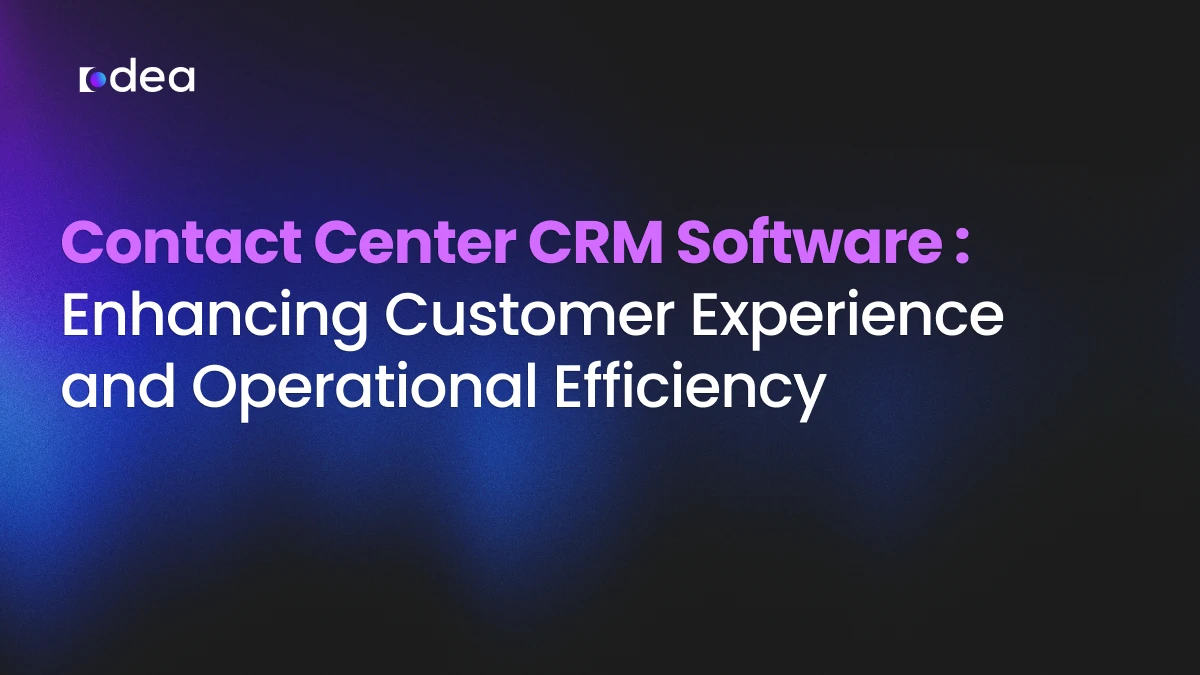Introduction
Customer Relationship Management (CRM) software is essential for businesses looking to enhance their customer service, streamline processes, and increase overall profitability. It enables companies to manage interactions with both current and potential customers by centralizing customer data. In today’s highly competitive market, CRM systems, such as those designed for contact centers, are indispensable in fostering personalized customer experiences and enhancing operational efficiency.
CRM systems collect data from multiple channels such as websites, email, social media, phone calls, and live chats, providing businesses with a 360-degree view of each customer. This data is invaluable for agents, allowing them to make informed decisions, personalize interactions, and resolve customer issues more effectively. Contact center CRM software stands as a core solution for managing and optimizing the ever-evolving relationship between businesses and their customers, allowing for better communication, service, and satisfaction.
What is Contact Center CRM Software?
Contact center CRM software is a specialized CRM solution designed to enhance the efficiency and effectiveness of contact centers. It integrates with communication channels like phone, email, chat, and social media, offering a unified interface for agents to manage all interactions seamlessly. By collecting and centralizing data from all customer touchpoints, contact center CRM software allows agents to access valuable insights about customer behavior, purchase history, and previous interactions.
Learn more about Contact Center CRM Software and how it benefits your business.
With these capabilities, contact center CRM software helps businesses deliver faster, more personalized customer support, driving customer satisfaction and retention. Moreover, it automates many manual processes, such as data entry and follow-ups, freeing up agents to handle more complex tasks. By streamlining operations, CRM software ultimately improves agent performance and overall customer experience.
Why Contact Center CRM Software Matters: Key Benefits
- Enhances Customer Experience The customer experience is one of the most crucial factors influencing business success. Imagine offering your customers an unforgettable journey—one where every interaction feels smooth, personal, and genuinely understood. Contact center CRM software makes that possible by giving agents a complete view of customer interactions across various channels. This empowers them to provide personalized support, resolve issues faster, and make every customer feel heard and valued.
Customers appreciate not having to repeat themselves. When agents can see past conversations, preferences, and history, it transforms every exchange into a seamless experience. With CRM software, contact centers can turn routine service into a moment of connection—building loyalty, trust, and long-term satisfaction.
Are you struggling to keep track of customer interactions across multiple channels?
Boosts Agent Productivity Your agents are the front line of your customer experience—and they deserve tools that truly empower them.
CRM software helps agents shine by giving them instant access to rich, detailed customer profiles. No more guessing or scrambling for information. With everything at their fingertips, agents can handle inquiries with confidence, speed, and care. Real-time insights and performance metrics give managers a clear picture of how their teams are doing—allowing for faster support, better coaching, and smarter decisions.
And with smart automation features like task reminders, call routing, and follow-up scheduling, your team can say goodbye to repetitive admin work and focus on what really matters: helping people.
Wouldn’t it be great if your agents had more time to focus on customer concerns instead of repetitive admin tasks?
Improves Operational Efficiency Imagine a workplace where repetitive tasks don’t slow your team down. CRM software takes care of the small stuff—like data entry, tracking, and manual follow-ups—so your team can focus on what truly drives value. By automating and centralizing everyday workflows, your business reduces costly errors and maintains consistency across the board. Managers gain a live snapshot of what’s happening inside the contact center, helping them deploy the right people in the right places at the right time.
And with a clear view into customer behavior and internal processes, you can spot bottlenecks before they become bigger issues—making your operation smoother and smarter every day. Learn how Contact Center as a Service (CCaaS) can enhance your operations.
What would your operations look like if routine tasks were automated and your team had access to real-time insights?
Facilitates Data-Driven Decision Making the right decisions starts with seeing the full picture. CRM software empowers you with real-time reports and insights that help you understand exactly what your customers want, how your team is performing, and where your business is heading.
No more relying on guesswork. With clear, up-to-date data at your fingertips, you can tweak your strategy on the fly, fine-tune service delivery, and solve issues before they escalate. This isn’t just about making better decisions—it’s about building a smarter, more responsive organization that grows with every interaction.
Key Features of Contact Center CRM Software
Modern contact center CRM software comes equipped with a host of features designed to streamline interactions and enhance customer service. Here are some of the core features of these systems:
- Multi-Channel Communication
Today’s customers engage with businesses through a variety of channels, from voice calls to social media. Contact center CRM systems offer multi-channel support, enabling businesses to manage interactions across all channels from a single interface. This feature ensures that customers receive consistent service no matter how they choose to contact the business. - Unified Customer View
One of the most significant benefits of contact center CRM software is the ability to consolidate all customer interactions and information into a unified view. With this 360-degree customer profile, agents can access the entire history of a customer’s interactions, preferences, and issues. This capability not only streamlines service delivery but also enhances personalization. - Easy-to-Understand Analytics and Reports

Contact Center CRM Software CRM software gives you real-time insights into how your contact center is performing with easy-to-read reports and dashboards. Managers can easily track things like how many calls are coming in, how well agents are doing, and how satisfied customers are. This helps everyone get a clear picture of how things are going. Plus, by looking at past data, you can spot patterns and areas where improvements can be made, leading to smarter decisions.
How much easier would your job be with clear, real-time reports at your fingertips?
- Automation and AI Tools to Improve Efficiency

Contact Center CRM Software AI-powered CRM software is changing the way contact centers work by automating everyday tasks and providing helpful predictions. For example, it can automatically handle things like directing calls, creating tickets, and setting up follow-ups, so everything runs smoothly. AI tools can also predict what customers need, allowing agents to address potential problems before they even happen. For instance, AI bots can handle simple customer questions, giving agents more time to focus on more complex issues.
Can you imagine how much more efficient your team could be if AI handled the repetitive stuff?
- Integration with Other Systems
Effective CRM software integrates seamlessly with existing business systems such as ERP, marketing platforms, and helpdesk tools. This ensures that all data flows smoothly across systems, giving businesses a comprehensive view of customer interactions. Integration capabilities also enable businesses to tailor their CRM systems to specific needs, making them more flexible and scalable.
Discover how Salesforce CTI integration can enhance your CRM system’s communication.
Challenges and Considerations in Contact Center CRM Software
While CRM software offers many advantages, businesses should also be mindful of potential challenges during implementation:
- Data Security and Privacy Protecting customer data is paramount in today’s digital world. Contact center CRM software must comply with privacy regulations such as GDPR and CCPA. Businesses should implement robust security measures to safeguard sensitive information and build customer trust.
- Scalability As businesses grow, so do their customer service needs. It’s important to choose CRM software that can scale to accommodate increased volumes of customer interactions. Cloud-based CRM solutions are particularly useful in this regard, offering flexibility and ease of expansion.
- Customization Needs Not all businesses are the same, and a one-size-fits-all approach may not always work. Ensuring the CRM software is customizable to suit the specific needs of the business is crucial for maximizing its potential. Customization can include workflows, dashboards, and integrations, ensuring the system fits seamlessly into the contact center’s operations.
- User Adoption Introducing new software into a contact center can be met with resistance. Training programs and continuous support are key to ensuring agents and managers can fully utilize the CRM system. By promoting user adoption and encouraging feedback, businesses can ensure a smooth transition and optimal system usage.
How Odea Helps with CRM Software Solutions
At Odea Integration, we understand the complexities involved in selecting and implementing the right CRM software for your contact center. We offer expert guidance and integration solutions that ensure your CRM system is aligned with your business goals, helping you deliver superior customer service and streamline operations. Whether you’re looking for cloud-based solutions, advanced AI features, or seamless integration with your existing systems, Odea provides the expertise to help you make the right choices.
Conclusion
In conclusion, contact center CRM software is essential for businesses looking to improve customer relationships, enhance service quality, and boost operational efficiency. By offering a unified view of customer data, automating routine tasks, and providing powerful insights, CRM systems enable businesses to provide personalized service and streamline operations. With the rise of AI and multi-channel support, the role of CRM software in contact centers is more crucial than ever.
As the CRM landscape continues to evolve, businesses must stay informed about the latest trends and technologies. Whether you are exploring cloud-based solutions, seeking industry-specific features, or aiming to integrate AI into your customer service strategy, selecting the right CRM software is key to success. Don’t let outdated systems hold you back. Let Odea help you build a smarter, more efficient contact center—where every interaction turns into an opportunity.
Contact Odea Integration today to learn more about how our CRM solutions can transform your contact center operations and drive better customer engagement.





